Keyword research is an essential part of content creation for Search Engine Optimization (SEO). For many businesses, it’s considered the top priority. In fact, Google has recorded over 2 trillion searches so far in 2022. With such an eye-popping statistic, you can see why conducting keyword research is required. Reaching more consumers is important, but you need to reach the right ones in order to benefit from them. In this post, we’ll discuss what keyword research is, why it’s important to your website or business, and all the tips you need to do it right.
Let’s jump in!
- 1 What is a Keyword?
- 2 What is Keyword Research?
- 3 Why Keyword Research is Important for SEO
- 4 Building a SEO Keyword Strategy
- 5 Finding the Right SEO Keyword Research Tools
-
6
How to do Keyword Research (Essential Steps)
- 6.1 Make a List of Topics that Make Sense for you and your Audience
- 6.2 Consider Search Intent and Related Search Terms for Topic Ideas
- 6.3 Important Factors to Look for When Researching Keywords
- 6.4 Start Grouping Keywords by Topic
- 6.5 Be Realistic about the Keywords you Choose
- 6.6 Look for short and long-tail keyword variations for your content
- 6.7 Take a Long Hard Look at Your Competitors
- 6.8 Keep track of your keyword performance
- 6.9 Bonus Tip: Keyword Research by Location
-
7
Keyword Research FAQs
- 7.1 What’s the Difference in Long-Tail and Short-Tail Keywords?
- 7.2 How Do I Determine a User’s Search Intent?
- 7.3 How Do I Know if a Keyword is Any Good?
- 7.4 What is the Best Keyword Research Tool?
- 7.5 Can My Site Rank Without Keyword Research?
- 7.6 I Did Research on X Keyword, and I’m Still Not Ranking. Why Not?
- 7.7 Is It Ok to Reuse a Focus Keyword?
- 7.8 How Many Times Should I Use a Keyword in My Content?
- 8 Conclusion
What is a Keyword?

A keyword is a word or phrase that defines what your content is about. When it comes to SEO, a keyword is a term that an internet user inputs to search for something they are interested in. Unless you’ve been living under a rock, you know that when searching for things on Google or other search engines, you type in search words to get results.
For example, if you are interested in becoming a casual runner, you might search for running tips. Perhaps you’re looking for the best shoes for running. It is likely that you will search for the term best running shoes. Those search terms are keywords, and anyone using a search engine utilizes them.
What is Keyword Research?
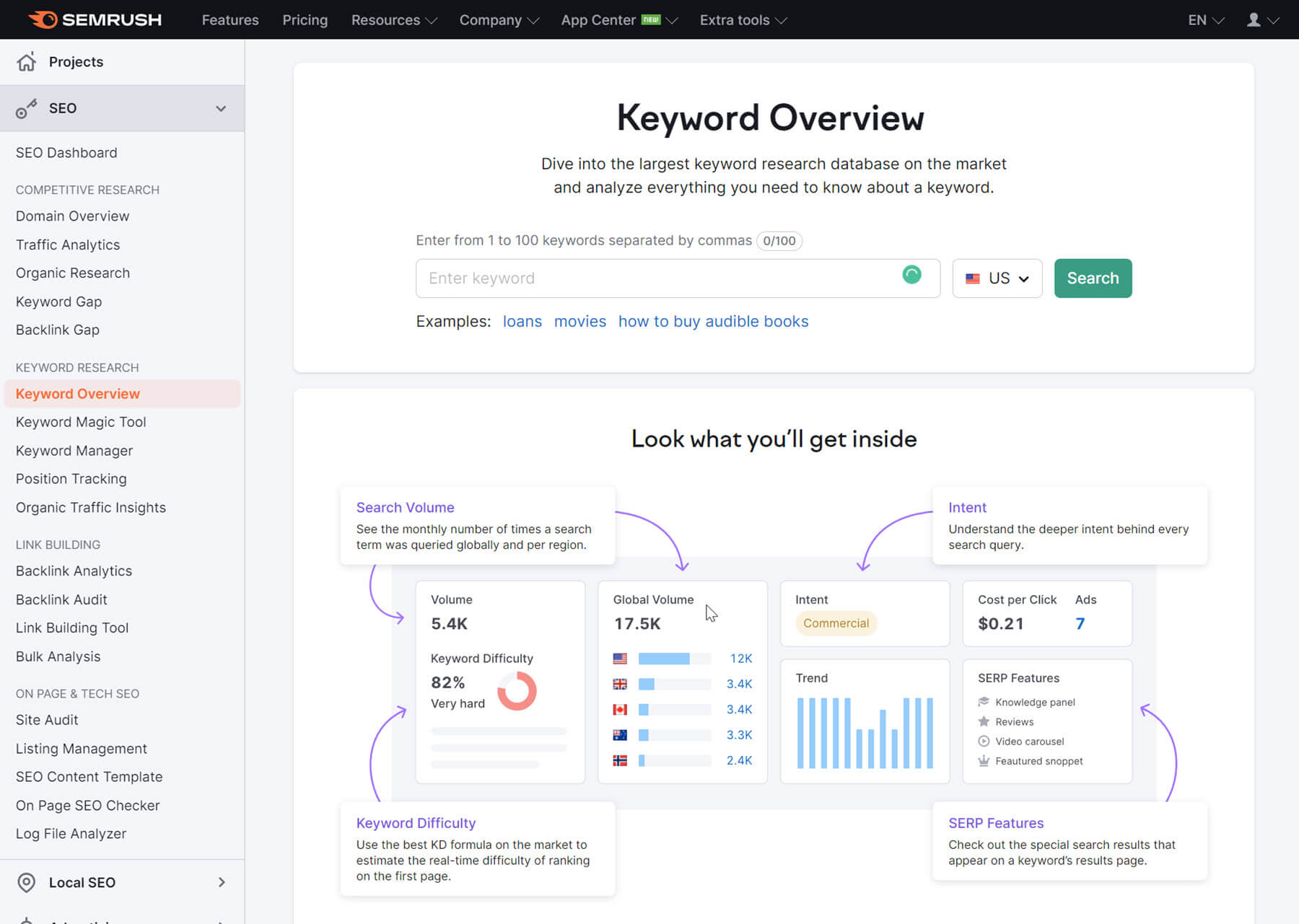
Keyword Research is the process of determining what keywords you should use in your written content that will aid in getting visitors to your site. Keyword research is a technique that businesses and marketers use to determine what people are searching for. It’s how they gauge which words are most popular.
The results of good keyword research are incorporated into new content (or existing content) to help boost their SEO rankings in the search engine ranking pages (SERPs). Keyword research is beneficial for SEO as well as general marketing purposes. Additionally, keyword research can help marketers discover words that they might not have thought of, which can be beneficial when creating new page content or products.
Why Keyword Research is Important for SEO

Keyword research has many benefits. Among them is gaining valuable insight into your audience, the possibility of increased organic traffic, and improved search engine results rankings.
Reveals Valuable Insight into Your Audience
Keyword research will help you understand what your target audience wants by showing you what they are searching for. You’ll learn what questions they are asking search engines to help solve problems they are facing. If your business sells running shoes, keyword research can connect you with potential customers who are looking to purchase them. One good way to measure this is to use a keyword research tool. They are great tools to help you determine what people are searching for based on a specific search term. There are many tools out there that can help. We’ll touch on those a bit later.
Increases Your Organic Traffic
Organic traffic is traffic that is earned by the quality of your SEO content. And the more organic traffic you get, the higher your search engine ranking grows. Also, organic traffic is free, so from a marketing standpoint, investing in a good keyword strategy and other SEO techniques is worth the time and energy. This allows you to get to the top of the search rankings without having to resort to PPC advertising. Plus, if your content is reaching the top organically, you will have a much better click-through rate than even paid ads.
Improves Ranking in SERPs
Keyword research can help put you in a better position in search results. With the right keywords, more people will be able to find you based on what they are searching for. When you move higher in search engine rankings, you increase the likelihood of not only being seen, but getting more clicks to your website.
Acquires more Customers
If your website has good SEO copywriting with keywords that target the right consumers, you are better suited to meet their needs. Researching keywords based on search intent rather than volume is a great strategy in acquiring more business.
Building a SEO Keyword Strategy

When it comes to keyword research, it helps to have a good strategy in place beforehand. Doing so increases the chances you’ll choose the right keywords, earn better results in search engines, increase traffic to your site, and gain new customers. A good keyword strategy will be integral to your overall SEO strategy which will involve creating SEO Content and good SEO techniques. Here are a few important elements to building a keyword strategy for your site.
Know Your Business (what you are offering)
Having a deep understanding of your website or business and what you offer (products, services, content, etc.) is a great first step for keyword research. This helps identify what kind of topics and content you want to include on your site. If you are a hosting company, your website will likely include content (landing pages, blog posts, etc.) about your hosting services (like “WordPress Hosting” or “Page Speed Optimization”). gives you an idea of where to start your keyword research.
Know your Audience (what they are searching for)
In addition to understanding what you have to offer, you will also need to consider what your audience (or potential customer) is searching for. Before researching keywords that a general audience is looking for, it’s probably better to first understand what your specific target customer is looking for on your site. You may already have a good idea of what this is based on customer personas and or customer journey maps. Having this insight into your audience will help you find the right keywords that will not only drive more traffic to your site but also boost conversions.
Know Your Competition
Knowing what your competition is doing can help you determine what to do, and not do when it comes to keyword research. If you don’t know who your main competitors are, take the time to find out. Researching your direct competition is key to beating them in the search ranks. Look at the kind of content they are producing, the topics they are covering, and which ones are performing the best. This will help you develop a keyword strategy that, in many ways, reverse engineers the strategy of your competition. Plus, you will be able to take note of their highest-ranking keywords and determine if they’re missing any high-volume keywords that would work for your business.
Know Your Search Engines
Understanding how search engines index top-ranking content according to keyword usage will help you recreate the process for your own keyword strategy. It is also a good idea to familiarize yourself with Search Engine Ranking Pages (SERPs) and how they index and display featured snippets based on the keywords used and the structure (or schema markup) of your content. If you are looking for good tools or plugins to help you with your schema, WordPress has many that you can add to your site.
Know Your Data
Analyzing your website’s data using Google Analytics and the Google Search Console will help you evaluate your current content and give you ideas for new topics or keywords to pursue. Use the analytics tools at your disposal to learn everything you need to know about the current state of your content and the content of your competitors. Install these tools with a WordPress Analytics plugin very easily.
Finding the Right SEO Keyword Research Tools
There are tons of free SEO tools available to assist you in SEO and keyword research. Tools such as SEMrush, Ahfers, Moz, and Google Ads: Keyword Planner are all excellent tools to consider.

SemRush
For a complete list, check out these best keyword research tools for SEO.
How to do Keyword Research (Essential Steps)
In order to be successful when conducting keyword research, there are a few tips you can follow. Let’s discuss them individually so that you can gain a better understanding of how to get better SEO on your website.
Make a List of Topics that Make Sense for you and your Audience
Before doing in-depth research on keywords, you need a good idea of what topics and to target. The best ones will make sense both for your business and also for your potential customers. This is why having a good understanding of both your business and your target audience will help.
Brainstorm some keywords based on your most relevant content. Start by identifying 5-10 topics to begin your research. These are likely to be repeated throughout your site and hold the most weight in your content (like the main categories for a blog). Also, research trending topics to see what people are searching for that would make sense for you to create content for.
Google is the master of matching searches to user intent. Because of this, you can use Google’s search bar to conduct keyword research for your own brand. Using this method can provide you with quite a few topic ideas for your site, and it can help you discover some fantastic secondary keywords as well. Google offers 3 features that can produce high-volume keywords including autocomplete, people also ask, and related searches.
Google Autocomplete
Autocomplete occurs when you start to type a keyword into the Google search bar. Google will do its best to predict what you’re going to type in next using a collection of popular searches by other users. As you type, predictions are adjusted based on the characters entered. Let’s use our running shoes example. When you start to type running shoes, Google will autocomplete a list of the most searched terms related to it.
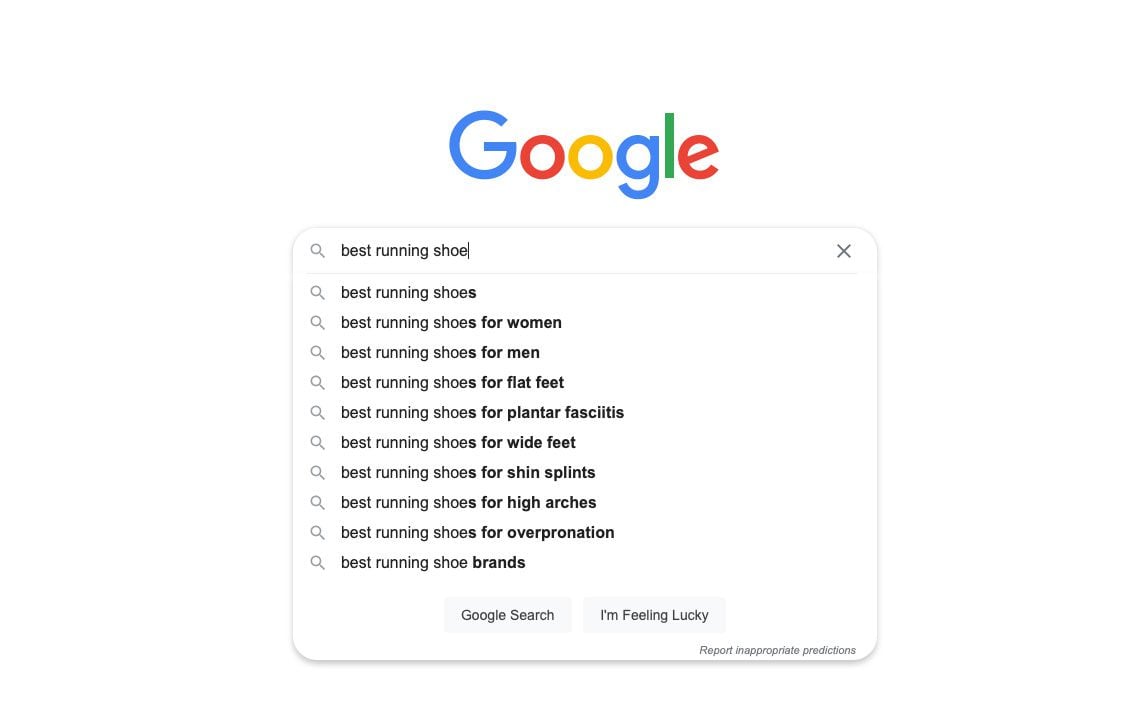
You can get a wealth of information just by using this one Google feature.
People Also Ask
After typing a search term into the search bar, you’ll see a people also ask section under the first few results. Clicking through those results will result in even more questions or terms. These are the most commonly asked questions related to that exact search term. Talk about great search volume! Let’s take another look at our search term running shoes. Upon executing the query, Google provides us with this group of terms.

As we click through the results, Google presents us with even more questions chock full of high-volume keyword options.
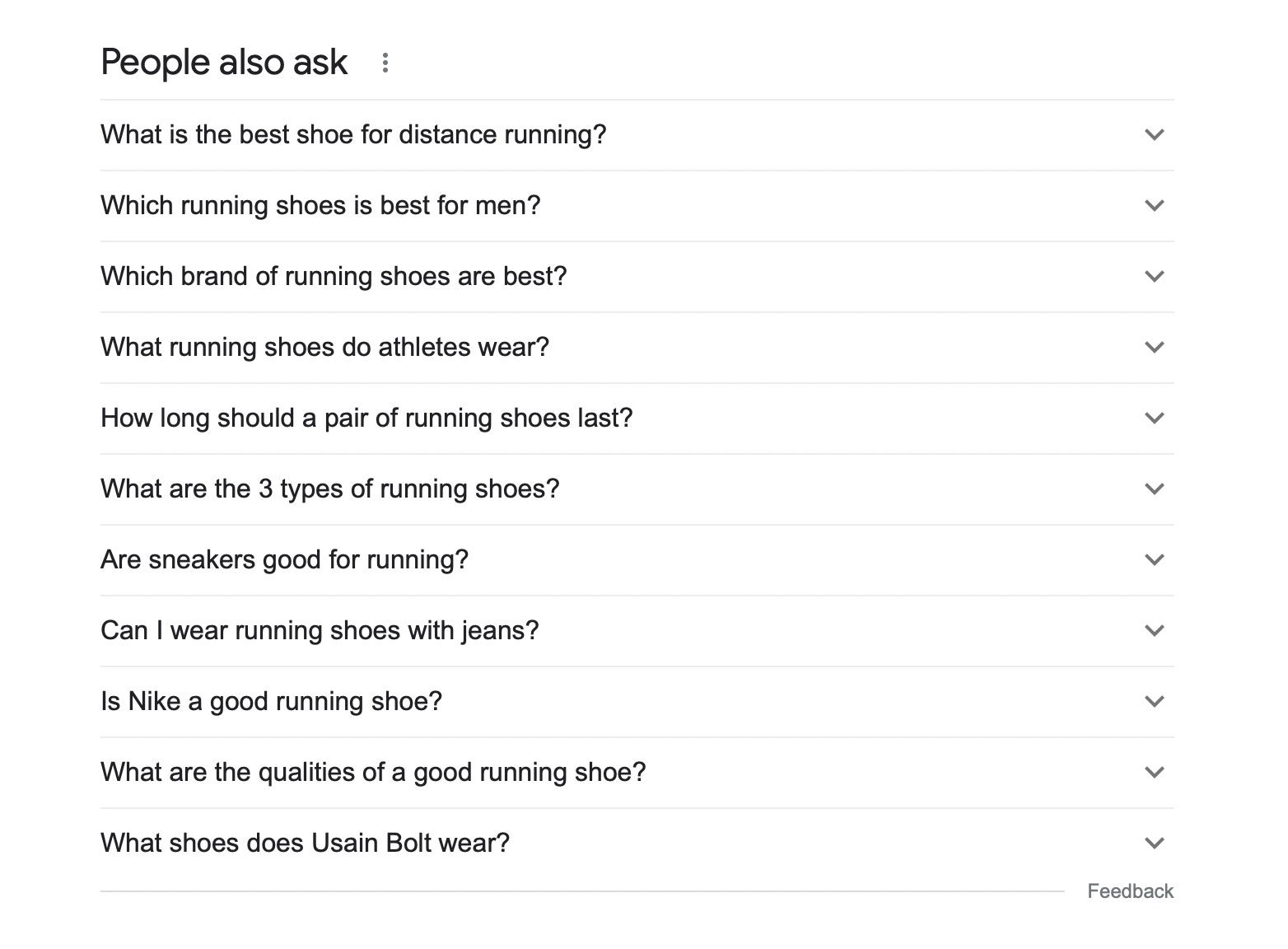
Using this method not only provides keyword options, but perhaps blog post ideas as well.
Related Searches
In addition to user intent, consider checking out related search terms to get some ideas for keywords. As an example, try searching for running shoes on Google. Underneath the top search results, Google provides you with the ‘people also ask’ section with some common search terms posed by other users. This is an often overlooked step in a good keyword research strategy. These are known as seed keywords. They are basically a starting point for developing longer keywords with modifiers. A seed keyword can consist of one or two words, and they are keyword gold.
Google will try and anticipate your next question by providing you with some common searches related to the topic you searched for. There is much to be gained from this gift from Google. Using this example, you could concentrate on researching trending running shoes, or best running shoe brand, along with best rated running trainers.

Additionally, Google will provide you with related searches. These are potential searches based on the original running shoe keyword search. In some cases, you’ll even be given some brands that you can incorporate into your keyword research. A lot of times, good marketers will put keywords into their titles and meta descriptions. Dig through the top Google search results and pay attention to those areas of search results as well.
Once you have a good list of topics and potential keywords, you can start researching how these keywords are currently performing in the search engines so you can cut down your list.
Important Factors to Look for When Researching Keywords
There are a few important factors to consider when researching keywords. Considering keyword difficulty, search volume, and search intent goes a long way when developing keywords for your site.
Keyword Difficulty
The first is Keyword Difficulty. This refers to how hard it will be to rank for a particular keyword. The higher the score, the more difficult it will be for your term to rank in search results. Once you determine how high the ranking is, you can decide whether or not to tweak your content to use that particular keyword.
Ahref has a free tool called Keyword Generator that will help you during your research. Simply type in a keyword, and the free version will provide you with the first 100 keywords related to your term. You’ll also be able to see questions posed by searches related to your keyword, which is a great tool to determine keywords to use. The first 10 results will give you the keyword difficulty rating.
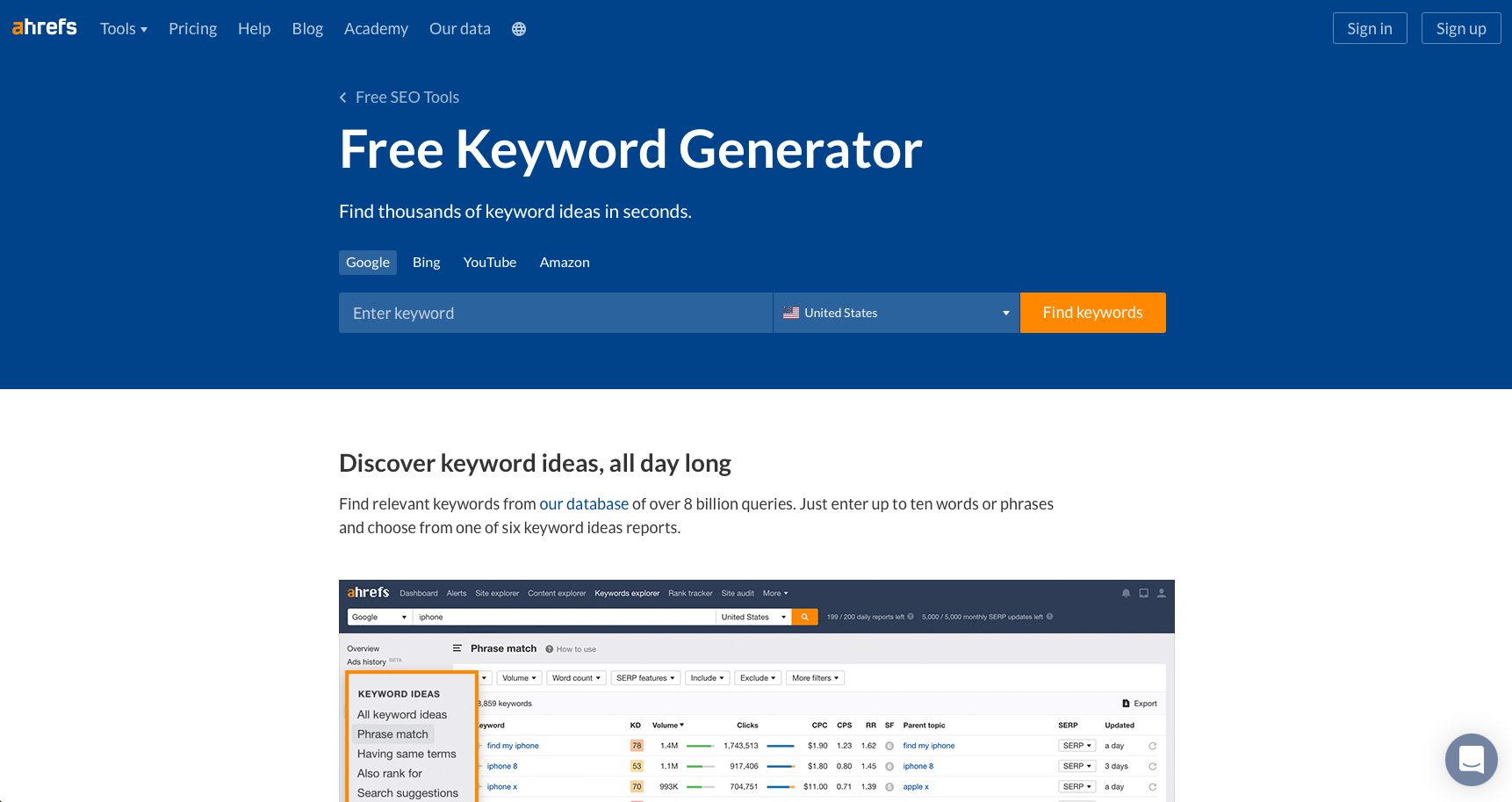
Search Volume
This refers to the number of times a particular keyword is searched for in any given period of time. A good place to start is by looking for the average number of searches per month. You can learn quite a bit from search volume, but you should take the results with a grain of salt. Even though searches can be high for a keyword, that doesn’t mean that it’ll result in increased traffic to your site. A high search volume generally means more competition.
For example, let’s say that the keyword running shoes gets 20,000 searches per month. While this is a high number, it doesn’t measure the intent of those searching. Another thing to remember is that doesn’t mean that everyone who searched for it actually clicked on it. A lot of times people will get the result they want right in Google, so they move on.
That being said, your content does need to be relevant to what people are searching for. So, it’s a good idea to keep search volume in mind when doing keyword research.
Search Intent
Moving forward, Google is placing a lot more emphasis on search intent. If you don’t consider a user’s search intent in your keywords, you’re going to have a lot harder time ranking in search engines. Many of the best WordPress SEO plugins will provide the search intent of a particular keyword. Familiarize yourself with the types of search intent and use that to help you when choosing keywords for your site. The types of search intent are as follows:
Navigational: Are they Googling using a navigational intent? For example, someone searching for the terms login or sign up rather than going directly to a URL.
Informational: This means they are searching for information about a topic or answer they seek.
Investigation: A user is looking for a type of product or a particular one. They are likely looking for reviews or comparisons in order to determine which product is right for them.
Transactional: This user knows what they want, and they are ready to pull the trigger on the purchase. At this point, they are likely searching for the best deal.
In practice, you will want to make sure the user’s search intent for a keyword matches the goal of your content. For example, you don’t want to try and rank for a keyword that has a transactional (or commercial) search intent when the goal of your content is informational. Even if your traffic increases temporarily, ultimately it will prove less helpful to users.
Start Grouping Keywords by Topic
Once you have your main topics/keywords, you can start grouping keywords under each of the main keyword topics. Keyword grouping is the process of grouping, or clustering a group of keywords together. Make sure to include different related keywords and keyword variations including short (stem) keywords, long-tail keywords, and questions. Using a keyword research tool should be able to give you a ton of results with relevant data to help group your lists of keywords.
One simple way to start grouping keywords is to use a spreadsheet. List your main keywords (or topics) at the top with related keywords under each one. Then you can color code each keyword according to their keyword difficulty and add an additional column for search volume. This will help you identify the ones you want to start creating content for.
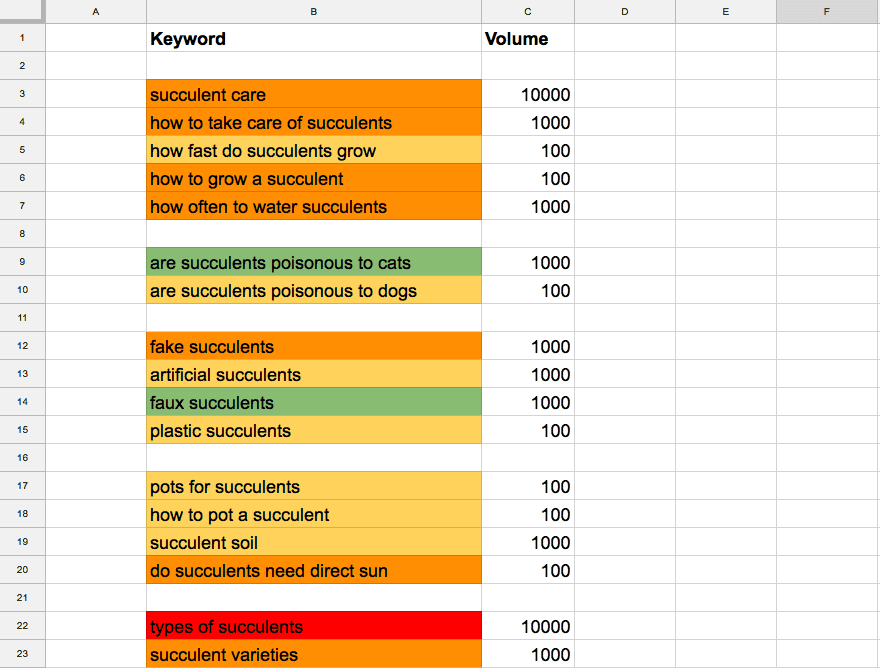
In addition to keyword grouping, consider mapping your keywords. Keyword Mapping is effective because it allows you to create a map of related keywords for your site. This would require using a keyword research tool like SEMRush to make this process easier to track.
Grouping keywords will help you create clusters of topics/content. These clusters will help support and create cornerstone content which is an important part of your SEO keyword strategy.
Be Realistic about the Keywords you Choose
If you have high domain authority, you may be able to choose more competitive keywords with a higher volume and difficulty. If you are just starting out, you will want to look for those keywords that are less competitive but still have a search volume that is worth your time. In general, it is best to start with those you know you have a chance to rank first. Then as you build more content and authority, you can go after those difficult keywords.
Most Keyword research tools will show you different keyword variations with their current volume and difficulty so that you can choose the best one for your keyword strategy.
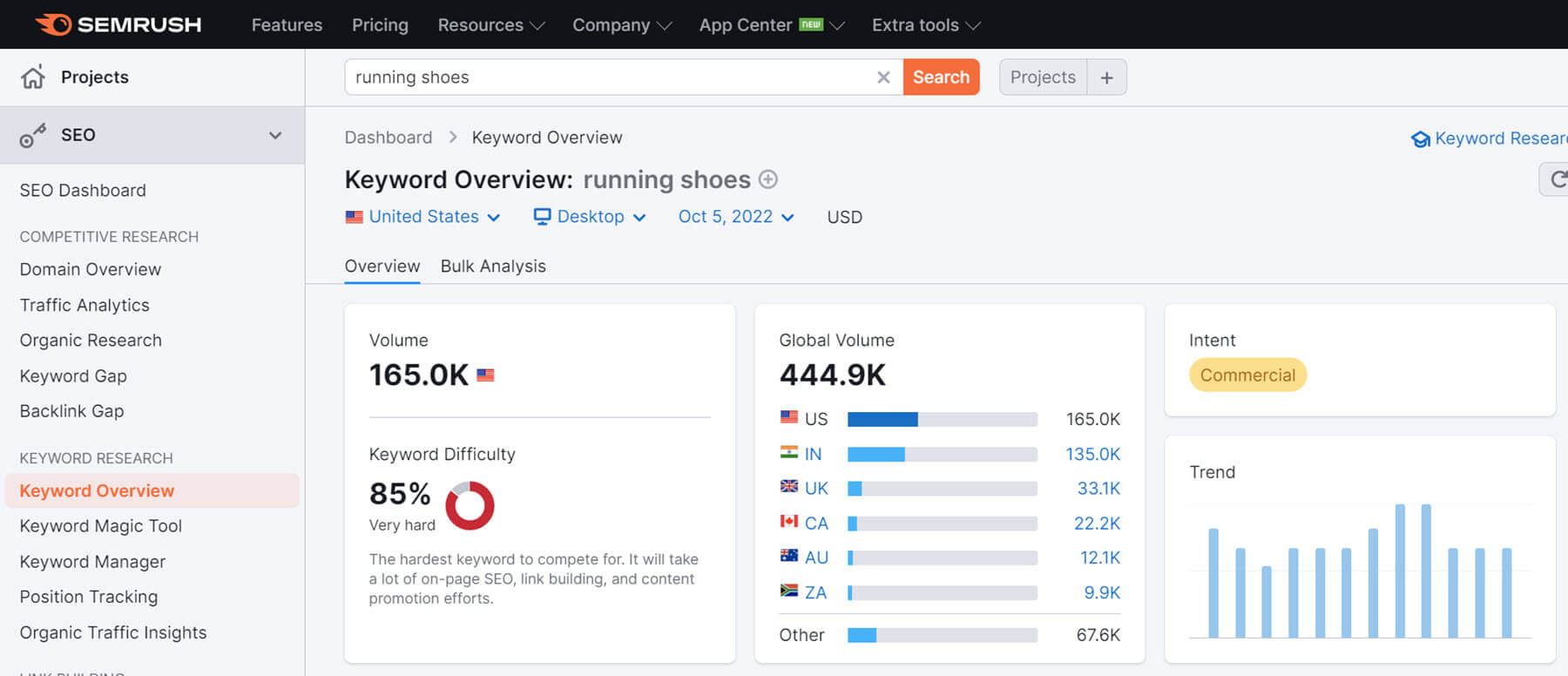
Usually, the keywords that are most difficult to rank for are the stem (or seed) keywords. Don’t be afraid of going after those long-tail keywords, especially those in the form of a question. Sometimes these will give you the best results considering how important Google factors in user intent (not to mention how many voice searches are being conducted in the form of a question on mobile these days).
Look for short and long-tail keyword variations for your content
Using the same keyword/phrase on a post or page too much will raise a flag with Google. This is considered to be keyword stuffing. To avoid this, it is best to mix up your target keyword with different keyword variations including short and long-tail keywords. That’s why it is important to research keyword variations of your keyword.
Keep in mind, when writing your SEO content, try to use your target keywords only when it makes sense. If it seems forced or confusing to the user, most likely Google will notice. One good way to do this is to take advantage of keyword stemming which allows you to break up a target keyword phrase across an entire sentence and still be recognized as that target keyword.
Take a Long Hard Look at Your Competitors
Now that you know what your keywords are and how to balance long-tail and short-tail keywords, conduct a keyword gap analysis, or competitive keyword analysis, to get a leg up on your competition. Take note of their highest ranking keywords and determine if they’re missing any high-volume keywords that would work for your business. On the other hand, you could aggressively combat your competitors by using their highest-ranking keywords in order to lure business away from them.
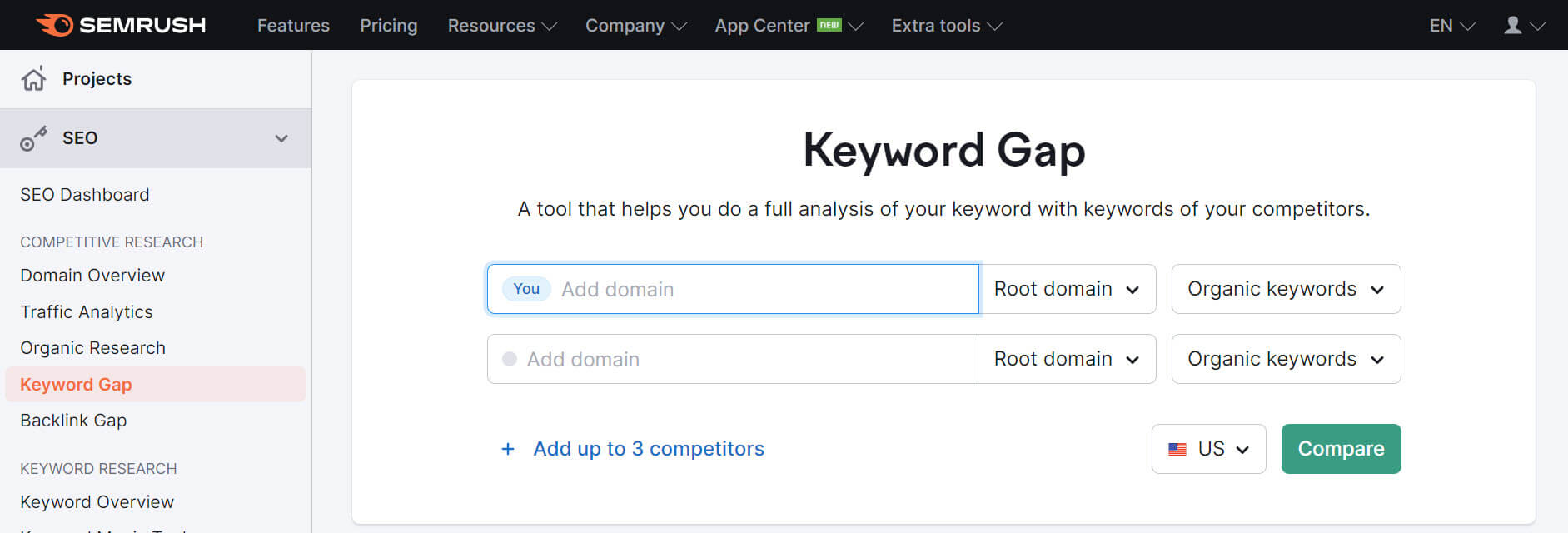
There are several tools you can use to find out what your competitors are using. Google’s Keyword Planner, SEMrush, or simply by utilizing the competitor website’s source code. For example, in Chrome, right-click on the page and choose View Page Source. Once you have access to the source code, look for elements such as the title, meta, and h1 tags.
Keep track of your keyword performance
When you’ve taken steps to research keywords that will help you in your quest for high rankings, it’s essential to keep track of how your keywords are performing. Adjustments may (and probably will) need to be made to get the results you are looking for. Keyword tracking tools can help you to improve your content strategy, which can result in increased traffic to your site. In addition to monitoring your current keywords, keyword tracking can provide you with new keyword ideas to incorporate into your content.
Bonus Tip: Keyword Research by Location
Knowing where your visitors are and what they search for can give you insight into purchasing patterns, and search patterns, and allow you to deliver relevant content to them. For example, if your website gets a lot of traffic from New York, you might consider using the term sneakers. Terminology can vary based on region. While customers in northern states may call athletic shoes sneakers, those in the South refer to them as tennis shoes.
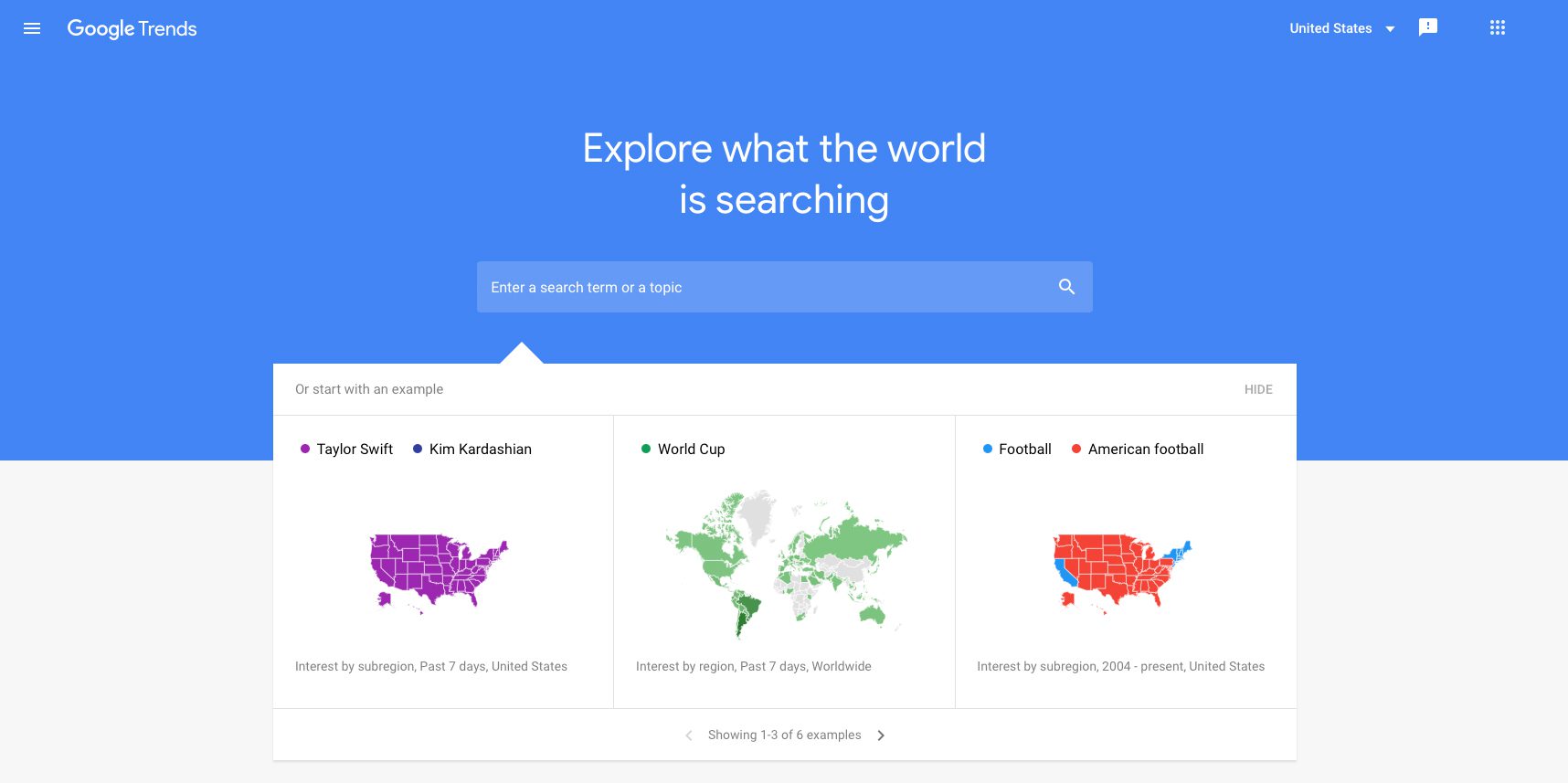
When you are developing your content, consider using Google Search Trends to research keywords based on region. This will allow you to develop your content with specific regions in mind. This is especially useful if your business is local. You can use your geographical location to determine what search terms your potential customers are using.
For more, check out our Local SEO Guide.
Keyword Research FAQs
With all of the information being thrown at you, you’re bound to have questions. No worries. We have answers.
What’s the Difference in Long-Tail and Short-Tail Keywords?
Long-tail keywords have four or more words, whereas short-tail keywords usually have up to three. Long-tail keywords are for more targeted searches, which is great for identifying consumers who are ready to make a purchase or have a specific question they need an answer to. Short-tail keywords tend to have a high search volume because they are broad. You can use short-tail keywords as seeds, which is a good strategy to help develop keywords over time.
How Do I Determine a User’s Search Intent?
One of the best ways is to sign up for a keyword research tool such as Ahrefs. If you are just starting out and don’t have the cash to throw towards a keyword research tool, your best strategy is to Google your own keywords. Google does a fantastic job of deciphering a user’s intent when they search. As previously mentioned, Google has three different approaches when you type in a keyword including autocomplete, people also ask, and related searches. Using Google’s own search bar is a great way to gain knowledge about the user’s intent. It is a simple way to get started and can be useful when developing new content.
How Do I Know if a Keyword is Any Good?
Track them. Good SEO is trial and error, and it requires a lot of maintenance. You can’t simply build a website with great content, then sit back and wait for people to flock to it. You need to start out with keywords you’ve researched, then monitor how they perform. A great tool for this is SEMrush. They offer both free and paid plans that are useful for tracking your keywords. The free version of SEMrush is more than enough to assist you in figuring out what is working and what isn’t.
What is the Best Keyword Research Tool?
That’s a loaded question. There really isn’t an all-in-one solution unless you want to pay for a complete solution. You can use a compilation of tools such as Google Search Trends, Google Search, and SEMrush, or an all-in-one solution like Ahref. You’ll most likely try a few until you find the one that is perfect for you. We’d suggest starting by reading our post on 5 of the Best Free and Premium Keyword Research Tools for SEO. This will be a good starting point to help you make a decision.
Can My Site Rank Without Keyword Research?
Yes, it can…but it’s not likely. Keyword research is a critical component of SEO. Without it, you’re simply rolling the dice and hoping for the best. With the amount of competition on the internet today, the best course of action is to do the work to give you the best shot at high rankings in search results.
I Did Research on X Keyword, and I’m Still Not Ranking. Why Not?
First, make sure that your site is indexed. If your site isn’t indexed, it can’t be crawled, nor can it be ranked. Next, be sure to submit your website to Google’s search console. Then check to make sure you aren’t blocking indexing. If you are on a WordPress site, navigate to Settings > Reading to ensure that the checkbox for Discourage search engines from indexing this site isn’t ticked.
If you’ve gone through the steps above and you still aren’t ranking, find out where you are ranking. Start by searching Google for your business name, primary keywords, secondary keywords, and words and phrases you’ve used in your content. If you aren’t coming up on the first page with those searches, adjust the search results by page on your search engine. Once you find out where you rank, you can take steps to get those rankings higher. Evaluate your keywords to determine if they’re falling in the overall rankings in Google searches by using your favorite keyword research tool. If you have keywords on the decline, it could be time to re-evaluate those failing words you’re using.
One important thing to note is not to change your content too much. Google doesn’t like it when you change things up too much, too often. As we’ve previously mentioned, good SEO takes time so you have to put in the work.
Is It Ok to Reuse a Focus Keyword?
It’s generally not recommended to use focus keywords more than once throughout your site’s pages or posts. You see, a “focus keyword” is a term used to rank your post or page in search results. If you use that same focus keyword on other pages or posts, you’re basically shooting yourself in the foot. The best course of action is to come up with unique focus keywords for each page you’re trying to rank for. Using them multiple times will hurt your search engine rankings, and cause you to actually compete with yourself. This is called keyword cannibalization and it can actually hurt your ranking in the SERPs. Check out our Simple Guide to Understanding and Fixing Keyword Cannibalization for tips and fixes for this common problem in SEO.
How Many Times Should I Use a Keyword in My Content?
Keyword density is an important factor to consider. While there’s no set number of times that you can use a keyword in a page or post, it is possible to overdo it. You can use an SEO plugin like Yoast or RankMath to help you find the right balance. In general, you will only want to use a keyword when it makes sense. Google will know when you are trying to force it.
Conclusion
Keyword Research is an essential part of your overall SEO strategy. Knowing your keywords, then doing the work to determine if they work well with your content goes a long way in getting your website to a good search engine ranking position.
Keep in mind that quality keyword research requires the right tools to help create a list of the right keywords for you. After that, it’s up to you to create the content using those keywords effectively. For Divi users, you might consider using the Rank Math SEO plugin to help with choosing and adding the right keywords on your product and category pages.
What is your keyword research process? Let us know by sounding off in the comments section below.







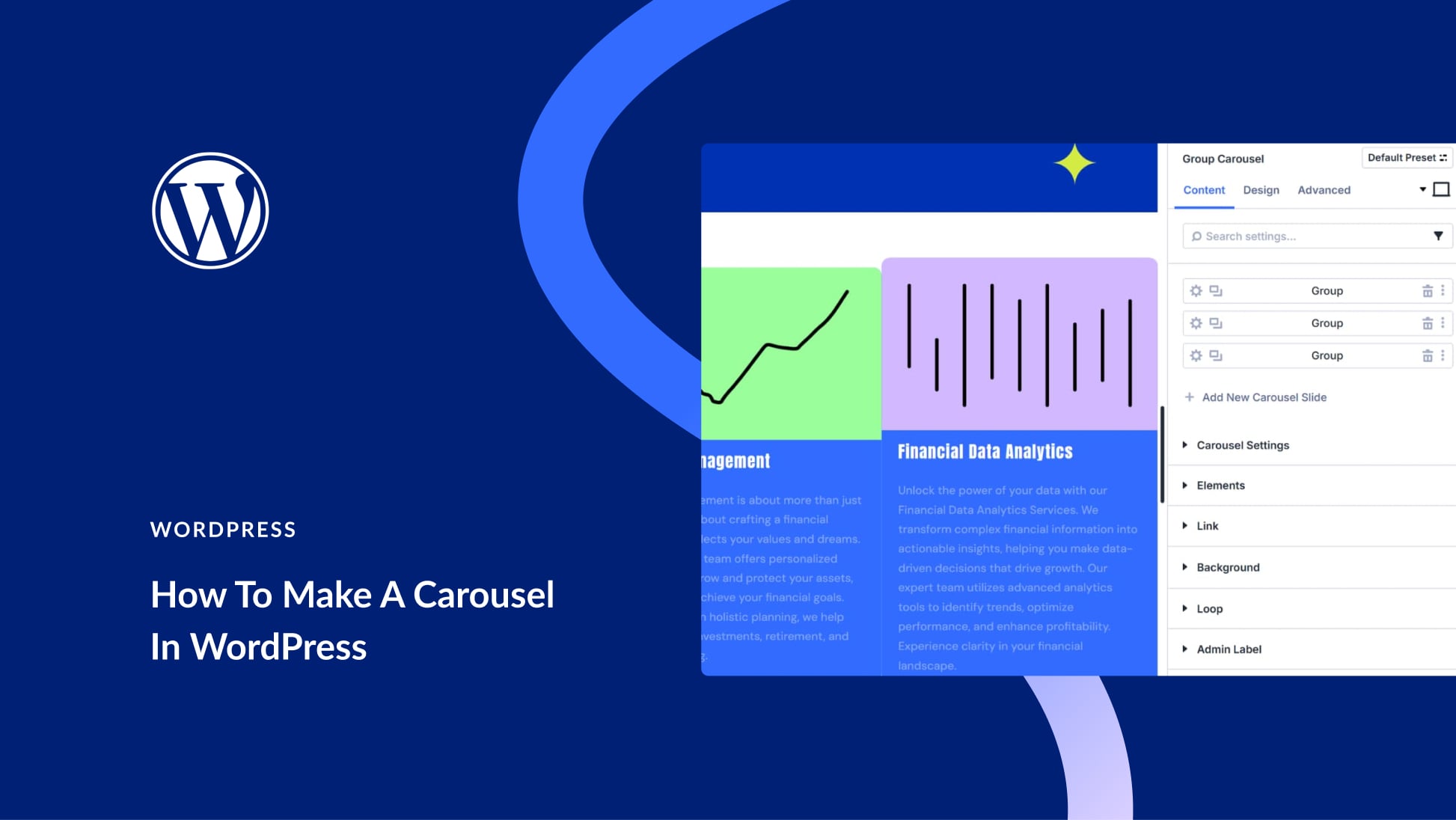

Leave A Reply